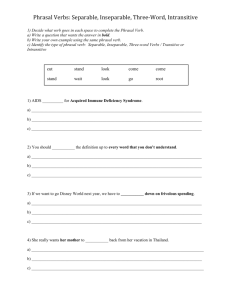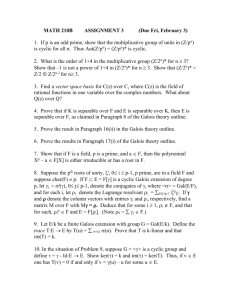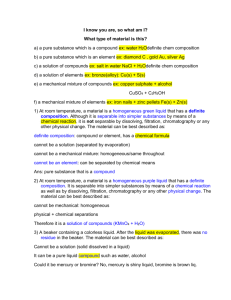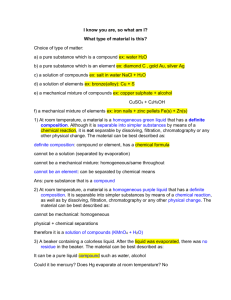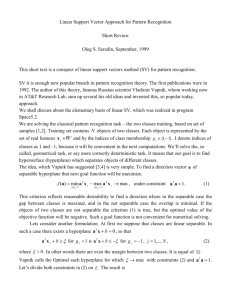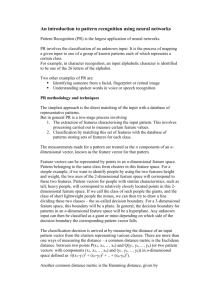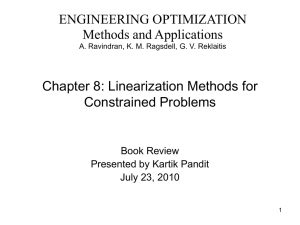Phrasal Verbs Resource
advertisement
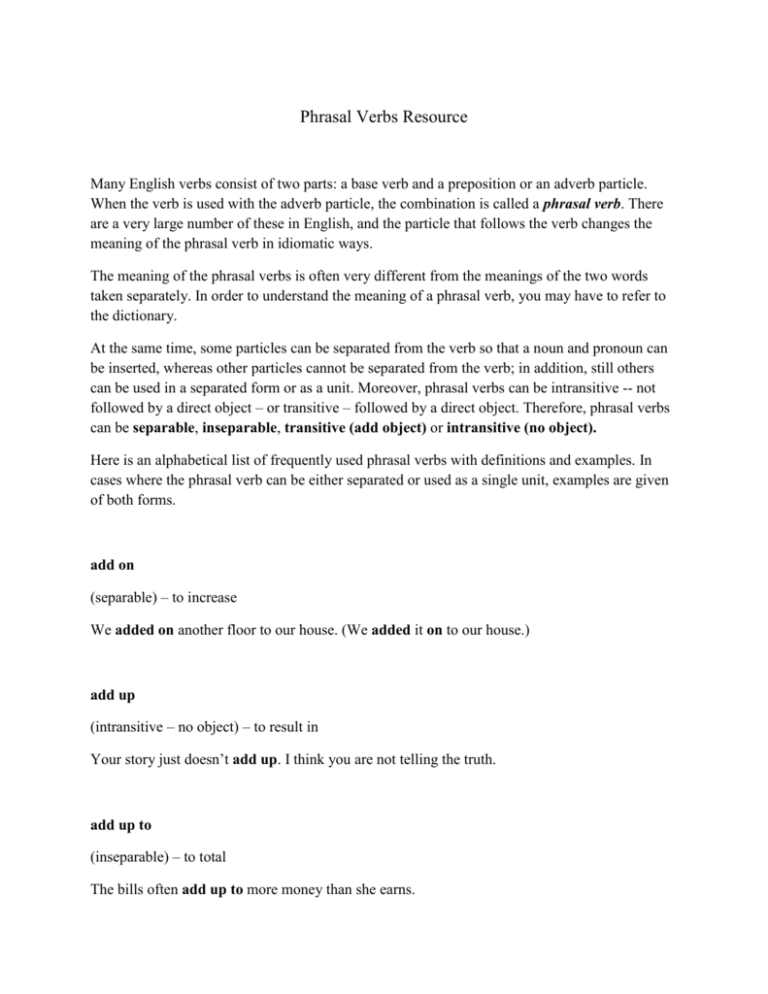
Phrasal Verbs Resource Many English verbs consist of two parts: a base verb and a preposition or an adverb particle. When the verb is used with the adverb particle, the combination is called a phrasal verb. There are a very large number of these in English, and the particle that follows the verb changes the meaning of the phrasal verb in idiomatic ways. The meaning of the phrasal verbs is often very different from the meanings of the two words taken separately. In order to understand the meaning of a phrasal verb, you may have to refer to the dictionary. At the same time, some particles can be separated from the verb so that a noun and pronoun can be inserted, whereas other particles cannot be separated from the verb; in addition, still others can be used in a separated form or as a unit. Moreover, phrasal verbs can be intransitive -- not followed by a direct object – or transitive – followed by a direct object. Therefore, phrasal verbs can be separable, inseparable, transitive (add object) or intransitive (no object). Here is an alphabetical list of frequently used phrasal verbs with definitions and examples. In cases where the phrasal verb can be either separated or used as a single unit, examples are given of both forms. add on (separable) – to increase We added on another floor to our house. (We added it on to our house.) add up (intransitive – no object) – to result in Your story just doesn’t add up. I think you are not telling the truth. add up to (inseparable) – to total The bills often add up to more money than she earns. ask for (inseparable) – to deserve a negative consequence Why are you asking for trouble? ask out (separable) – to ask for a date Joe asked Mary out last night, and they went to see a movie. back away (intransitive – no object) – to retreat When Jim saw the dog, he backed away because he got scared. back off (intransitive - no object) – to abandon The bank robber backed off when he noticed two police cars parked in front of the bank. back up (1) (separable) – to reverse When he backed the car up in the driveway, he almost struck the cat. back up (2) (separable) – to support My sister always backs me up when I have problems. back up (3) (separable) – to confirm My brother will back me up if you don’t believe what I told you. back up (4) (separable) – to make copies of computer files You should back your data up at least once a week if you don’t want to risk losing any information. bail out (1) (intransitive -- no object) – to quit John bailed out of the competition when he found out that Sam was also competing. bail out (2) (separable) – to rescue When you lent me some money last month, you bailed me out of a difficult situation. bash in (separable) – to break Someone bashed in the side window of my car. (Someone bashed it in.) beat up (separable) – to hurt someone He has a black eye; someone must have beaten him up last night. black out (intransitive - no object) – to lose consciousness Jack hasn’t eaten anything for three days so he finally blacked out. blend in (intransitive - no object) – to match When you move to a new neighborhood, you’ll blend in after awhile. blow up (1) (separable) – to inflate Please blow up only the red balloons for Sally’s birthday party. (Can you blow them up?) blow up (2) (separable) – to explode The contractors will blow up the old hotel tomorrow so they can build a new townhouse complex. (They will blow it up.) blow up (3) (intransitive - no object) – to become angry He blew up when the opposing team won the game in the last minute of overtime. boss around (separable) – to order people what to do The new supervisor likes to boss around the employees. (He likes to boss them around.) break down (1) (separable) – to separate into parts He did not understand the sentence, so Mary broke it down into separate words, translating each separately. break down (2) (intransitive - no object) – to stop functioning When his computer breaks down, Peter can always fix it. break down (3) (intransitive - no object) – to lose control Chrissie broke down in tears when she failed the exam. break in (1) (intransitive - no object) – to enter by using force The thief broke in the apartment while the family was away on holidays. break in (2) (separable) – to wear something until it is comfortable When I buy new shoes, first, I need to break them in, in order not to hurt myself. break up (inseparable) – to scatter Last night, the gathering broke up around midnight. break up (with) (inseparable) – to end a relationship Lisa broke up with Jack when she met Joe. bring down (separable) – to cause to fail Julia is very jealous of Jill’s success, so Julia would do anything to bring Jill down. bring forth (inseparable) – to produce Your thoughtful remark will bring forth lots of discussion during the meeting later today. bring in (separable) – to earn money Claudia has a very stressful job, but she brings more money in than her brother. bring on (separable) – to cause to start When you bring the music on, the show will start. bring up (1) (separable) – to mention Sara never brings Eric’s past up when they visit her grandparents. bring up (2) (separable) – to raise to maturity Sandra’s husband brought the children up alone after his wife died in a car accident. brush up on (intransitive - no object) – to practice I’ll need to brush up on my Spanish when I move to Mexico. burn down (inseparable) – to destroy by fire Sasha’s hometown in Central Europe burned down several times during the Middle Ages. burn up (separable) – to cause anger The insurance agent burned Sam up when the agent did not want to discuss Sam’s options. Sam got burned up when the insurance agent didn’t want to discuss options for car insurance. butt in (intransitive - no object) – to interrupt You should not butt in unless you are invited to join the group. butter up (separable) – to flatter Billy has been buttering Jenny up all week hoping to get a pay raise at the end of the month. call on (inseparable) – to ask Cynthia always calls on you when she needs help; she trusts you. call off (separable) – to cancel There is nothing worse than calling a wedding off in the last moment. call up (separable) – to telephone Can I call you up later today and chat about your latest trip? calm down (inseparable) – to relax Kendra was very nervous but calmed down once she passed the driving test. care for (1) (inseparable) – to want Do you care for coffee or tea after lunch? care for (2) (inseparable) – to take care of Maggie cared for her ill grandmother for more than three years before Maggie’s sister took over. carry on (intransitive - no object) – to continue “Carry on,” the teacher said when she entered the classroom, and the students continued checking their homework. catch on (1) (intransitive - no object) – to become popular Being bald and wearing tattoos have caught on fairly quickly in many countries. catch on (2) (intransitive - no object) – to learn Children catch on very quickly when they learn languages. catch up (with) (inseparable) – to follow/reach “You can go ahead,” insisted Andrea. “I’ll catch up with you later.” check in (inseparable) – to register at a hotel or inn I can check in later. The hotel desk is open until 9PM. . check out (of) (inseparable) – to leave a hotel or inn We will need to check out of the hotel before noon, so we will still have time to go for a swim. cheer on (separable) – to support Hockey fans always cheer their teams on loudly on sports nights. cheer up (separable) – to help someone feel better When Lily is depressed, her brother cheers her up with jokes and cartoons. chicken out (intransitive - no object) – to give up Vivian chickened out in the last moment when Sam asked her to go bungee jumping. chip in (inseparable) – to contribute When we celebrate a birthday in the office, everyone chips in at least $5. clean up (separable) – to tidy up Students should always clean up after themselves at the end of the class. (Can you clean it up?) come across (inseparable) – to find I came across a very rare 16th century book while browsing the bookstores in old Berlin. come along (1) (intransitive - no object) – to progress How is your new project coming along? come along (2) (intransitive - no object) – to appear When Anna came along after class, Johnny became very quiet. come around (intransitive - no object) – to change one’s opinion When will you come around and finally agree with me? come by (inseparable) – to obtain I came by many second hand sweaters since my older sister got rid of them very fast. come down (with) (inseparable) – to become sick Every winter, I came down with the flu. come into (inseparable) -- to acquire George came into a fortune when his parents suddenly died. come on (intransitive - no object) – to reflect Stacey comes on as a tough person, but in fact, she is very sensitive. come on (intransitive - no object) – to become available The hot water came on very late last night since the plumber was fixing the pipes all day. come out (intransitive - no object) – to become known The beauty queen’s past came out during a routine reference check. come over (intransitive - no object) – to visit causally Why don’t you come over after the game and have lunch with us? come through (intransitive - no object) – to do what is expected William came through only after Wanda begged him for three days to get the tickets for the game. come to (inseparable) – to total Our charges came to an even number after we added the taxes and the extra commission. come up (intransitive - no object) – to be mentioned The topic of marriage never came up during the lovely couple’s conversations. come up with (inseparable) – to think of/invent Mary always comes up with very creative ideas. come upon (inseparable) – to discover by accident While cleaning the attic, I came upon a very rare and beautiful pearl necklace. count on (inseparable) – to depend on I have always counted on my brother sine he helped me and kept his promise no matter what. crank up (separable) – to increase “Crank up the volume on the radio so that I can also hear the speech!” (Crank it up!) cross out (separable) – to eliminate I crossed out all the typing mistakes in the document. (I crossed them out.) cut down on (inseparable) – to reduce Since gas is so expensive, Sheila decided to cut down on driving and walk instead. die down (intransitive - no object) – to decrease After midnight, the music died down next door, and I finally fell asleep. dig up (separable) – to look for The detective was unable to dig up any useful information on the suspect. (He couldn’t dig it up.) do in (separable) – to make tired Two games yesterday and one more today did the soccer player in. He slept through the whole weekend. do over (separable) – to redo The assignment was so poorly organized that I had to do the entire paper over. doze off (intransitive - no object) – to fall asleep The speech was so boring that almost everyone in the audience dozed off. drag on (intransitive - no object) – to continue endlessly After an interesting and dynamic start, the movie dragged on uneventfully for almost two hours. draw up (separable) – to prepare Before you write a research paper, it is always a good idea to draw up an outline first. (Draw it up, first!) dream up (separable) – to plan Johnny dreamed up the perfect game for Celia’s birthday party to keep all guests entertained. (Johnny dreamed it up.) dress up (inseparable) – to wear formal clothing When going to the opera, Misty loved dressing up and wearing her newest clothes. drink up (separable) – to finish a drink “Drink up your milk and let’s go. We’ll be late for school.” (Drink it up!) drop off (separable) – to deliver Mom drops the kids off for hockey practice, but dad picks them up and drives them home. drop in (inseparable) – to visit “Why don’t you drop in on Sunday and we can go over your essay homework.” drop out (of) (inseparable) – to stop attending He dropped out of college after the first semester since he wanted to get some work experience first. eat out (intransitive - no object) – to eat in a restaurant If you eat out every night, you won’t be able to save any money. eat up (separable) – to finish a meal “You can’t have dessert unless you eat up all your broccoli” mom told Tommy during lunch. (Eat it up!) end up (intransitive - no object) – to arrive After driving around for hours, we ended up exactly where we started. face up to (inseparable) – to admit to After failing the exam a few times, Jason had to face up to the fact that he would have to study more in order to pass. fall apart (1) (intransitive - no object) – to break down My first computer fell apart after only two months of use so I had to get a laptop. fall apart (2) (intransitive - no object) – to suffer emotionally After two deaths in the family, Mary fell apart and couldn’t work for awhile. fall down (intransitive - no object) – to fall to the ground The toddler fell down many times while learning how to walk. fall for (inseparable) – to be attracted to something or someone The deal was too good to refuse, so the buyer fell for the cheap offer only to find out it was a scam. fall through (intransitive - no object) – to not happen Our plan fell through when Jody didn’t show up, and we couldn’t play the game with one member missing. feel up to (inseparable) – to feel string enough Do you feel up to hiking that challenging trail now that it snowed all night? fight off (separable) – to keep something away I’ve been trying to fight off the flu all week, but finally I got sick. (I’ve been trying to fight it off.) figure out (separable) – to solve a problem I have finally figured out how my new cell-phone works even though it has too many functions. (I figured it out.) fill in (separable) – to complete The easiest part of the test was filling in the blanks. (I could fill them in easily.) fill in (on) (separable) – to supply information Can you fill me in on what happened in the meeting while I was away? fill in for (inseparable) – to substitute Can you please fill in for me while I am away? fill out (separable) – to complete a form First, you will need to fill out an application form, and then you can take the course. (You will need to fill it out.) fill up (separable) – to fill completely Before the road trip, we will need to fill up the tank. (We will need to fill it up.) find out (inseparable) – to get information I have just found out that we have a test tomorrow. fit in (intransitive - no object) – to get along When Mary moved to the new neighbourhood, she fit in right away since everybody liked gardening. free up (separable) – to make something available Can you free up some space in the closet so that I can store my winter clothes? (Can you free it up?) get across (separable) – to communicate clearly The girl was so stubborn that no one was able to get the message across and change her mind. get ahead (intransitive - no object) – to make progress You need to work hard in this company if you wish to get ahead and get promoted. get along (intransitive) – to have a good relationship Our team members have been getting along quite well before they lost the game. get around (1) (inseparable) – to avoid Jimmy got around doing homework every day by offering to volunteer after classes. get around (2) (intransitive - no object) – to go from place to place Since she leaves downtown, she gets around everywhere by walking. get at (intransitive - no object) – to hint What are you trying to get at? Can you be more specific and give an example? get away (intransitive - no object) – to escape Finally I caught a fish, but it got away because there was a hole in the net. get back (intransitive - no object) – to return Sandy always gets back late from school. She helps her team win the competition. get by (intransitive - no object) – to survive financially The family of four was able to get by on just $5 a day for a whole month. get down (to) (intransitive - no object) – to focus After you finish sightseeing, I’ll meet you in the boardroom and we’ll get down to business. get down (1) (separable) – to discourage When I told her I wanted to attend college, she really got me down telling me my scores were not high enough. get down (2) (separable) – to put in writing Who will get the minutes down during the meeting? get in (intransitive - no object) – to arrive The flight got in 2 hours late last night because of the storm. get off (1) (inseparable) – to leave Don’t forget your umbrella before you get off the bus. get off (2) (intransitive - no object) – to receive lesser punishment After striking a pedestrian, the biker got off with only a fine instead of going to jail. get off (3) (separable) – to interrupt Many schools in our city get the day off when it snows. get out (1) (intransitive - no object) – to spread Word gets out very fast in our small town, so everyone knew Jack would propose to Jill. get out (of) (2) (inseparable) – to escape Sam always has an excuse and gets out of having to wash the dishes. get out (of) (3) (inseparable) – to leave When will we finally get out of here? I am hungry! get over (inseparable) – to recover After that rigorous football practice, it took Jimmy a whole day to get over his sore muscles. get rid of (inseparable) – dispose of something or dismiss someone I cannot get rid of the unpleasant burning smell from my clothes; I’ll have to dry clean them. get through (inseparable) – to finish My new course is so challenging that I started doubting I’ll ever get through it. get to (1) (inseparable) – to annoy The dripping faucet really got to me. I cannot sleep! get to (2) (inseparable) – to arrive at What time do you usually get to work? get together (intransitive - no object) – to meet We should get together for coffee during the holidays. get up (intransitive - no object) – to leave the bed What time do you usually get up in the morning? give back (separable) – to return Can you give me back the book I lent you a week ago? give out (inseparable) – to distribute The Red Cross gives out food and various charitable donations to victims of an earthquake. give up (separable) – to stop “Why can’t you give it up?” asked Cindy while watching Andy smoke. go along (intransitive - no object) – to cooperate We need to go along with the most popular vote if we want to stay in business. go around (1) (intransitive - no object) – to satisfy There is not enough bread left to go around for another day. We need to buy some more food. go around (2) (intransitive - no object) – to circulate Word goes around that you are going to quit. Is it true? go away (intransitive - no object) – to leave Will you go away during the spring break? I heard there are good deals for one-week trips. go by (1) (intransitive - no object) – to pass Tina is a new driver, but as the days go by, she gets more and more confident. go by (2) (inseparable) – to act correctly In order to avoid a fine, you need to go by the rules. go down (intransitive - no object) – to sink Many people died when the Titanic went down. go off (intransitive - no object) – to explode Firecrackers are both noisy and dangerous when they go off. go over (inseparable) – to check We should go over the routine one more time before you start your performance. go out with (inseparable) – to have a date When will you finally go out with Sara? She’s been asking about you for a month now. go through (inseparable) – to endure When shipwrecked on a desert island, Jack had to go through lots of hardships in order to survive. go with (intransitive - no object) – to match That blue shirt goes with both your eyes and your jeans. go under (intransitive - no object) – to fail During the economic crisis, small businesses go under first. goof off (intransitive - no object) – to be inactive Instead of doing his homework, Tommy goofed off all weekend. grow up (1) (intransitive) – to become an adult While he was growing up, his family moved frequently from town to town. grow up (2) (intransitive) – to behave responsibly Stop goofing around and being childish! It’s time to grow up and do some serious work. hand in (separable) – to submit work When did you hand in your homework? I did not see you handing it in. hand out (separable) – to distribute After the earthquake, the Red Cross handed out blankets and food to the survivors. Who handed the water out? hang around (intransitive) – to spend time Teenagers often hang around malls instead of libraries these days. hang up (separable) – to end a phone call Why did you hang up the phone last night? You should not hang it up before we say goodbye. have to do with (inseparable) – to be about something My most recent class has to do with the behaviour of animals in isolation. hike up (1) (separable) – to pull up (usually clothing) Tommy hiked up his socks and ran to the playground. He hiked them up so fast I didn’t have a chance to tell him the colors didn’t match. hike up (2) (separable) – to suddenly raise in amount The gas prices were hiked up once again over the weekend. Who do you think is responsible for hiking them up? hold back (separable) – to restrain If you have something to say, I want to hear it. Don’t hold it back! hold down (separable) – to keep a job Tina was never able to hold a job down for more than two months. She just lost interest and quit. hold on (intransitive) – to wait Can you hold on a minute? I forgot my car keys in the office. hold up (1) (separable) – to lift Hold up the chart so that everyone can see it. Can you hold it up? hold up (2) (separable) – to delay Because of the police incident down town, I was held up in traffic for hours. The traffic jam held me up. hold up (3) (separable) – to rob When the two thieves held the cashier up, they did not realize that two police officers were shopping in the store. hunt down (separable) – to find) I finally hunted the landlord down and paid the rent. He was fixing the boilers in the basement. hurry up (intransitive) – to do faster If you don’t hurry up, we’ll be late for the show. hush up (intransitive) – to become quiet When the famous actress stepped on the stage, the audience hushed up. iron out (separable) – mutually resolve difficulties Susan and Done may have many problems, but they always iron their misunderstandings out. jack up (separable) – to raise prices Before Christmas, many vendors jack their prices up so they can maximize their profits. jot down (separable) – to make a note of During the politician’s speech, the reporters were both taking pictures and jotting his words down. jump in (intransitive) – to interrupt Mary was trying to describe what happened during her trip, but her sister kept jumping in. keep away (separable) – to block form coming near The bodyguards were trying to keep the paparazzi away from the famous singer, but the guards were unsuccessful. keep down (separable) – to control “Keep the noise down!” shouted the angry neighbour. “It’s past midnight!” keep off (inseparable) – to not walk on This is a private property. Please keep off the premises. keep on (inseparable) – to continue Don’t give up now – you’re almost done! Keep on studying! keep up (1) (separable) – to persevere Your writing has visibly improved over the last few months. Keep it up! keep up (2) (separable) – to prevent from going to sleep My sister’s chatting kept me up half the night. keep up (3) (intransitive) – to stay informed You can check the Internet daily and keep up with the current events around the globe. keep up (4) (intransitive) – to maintain a level of lifestyle It is impossible to keep up with the Smiths. They spend too much. kick out (separable) – to force to leave The sports fans were too noisy and started a fight in the bar; therefore, the bouncers kicked them out. kneel down (intransitive) – top go down on one’s knees Sam usually kneels down to play with his kids. knock out (separable) – to make someone unconscious The fighter knocked his opponent out and won the match and the championship. lay off (separable) – to dismiss from job The company laid its workers off before it went bankrupt last year. leave out (separable) – to omit “Leave me out of this. I don’t want to get involved.” replied the upset owner. let down (separable) – to disappoint The teacher had high hopes for Brian, but he let the teacher down and failed the course. let up (intransitive) – to become less intense It’s already May, and it is still snowing. Will it ever let up? lie down (intransitive) – to recline Why don’t you lie down and take a nap? It will rejuvenate you. lift up (separable) – to elevate something The parcel was so heavy that I was not able to lift it up. line up (intransitive) – to stand in line Thousands lined up to audition for the famous show. lock in (separable) – to lock the door so that someone can’t leave As a prank, Timmy locked his brother in the bathroom, but Timmy forgot Johnny had a cell phone and called 911. lock out (separable) – to lock the door so that someone can’t enter I locked myself out of the car when I left the keys on the car seat. look back on (inseparable) – to reflect on something When they looked back on their many travels, they realized they always had a good time. look down on (inseparable) – to consider inferior The rich tycoon looked down on homeless people, so he didn’t donate any money for the charity. look forward to (inseparable) – to anticipate pleasantly We are really looking forward to our yoga classes. look in on (inseparable) – to visit and check someone’s condition Could you look in on Celia while she is in the hospital? I am worried about her. look into (inseparable) – to investigate The police are looking into the fraud charges laid last month. It is hard to believe all the allegations about such a reputable company. look like (inseparable) – to resemble “You look like your mother when she was your age!” exclaimed my uncle. look out (intransitive) – to be careful Because of the big age difference, Jimmy always looked out for his little brother. look over (separable) – to check Before submitting it, I’d like to look the report over once more. look up (1) (separable) – to find information in a source Can you look this up in your textbook? I am not sure what you are referring to here. look up (2) (separable) – to visit someone Don’t forget to look me up when you visit our town next time. look up to (inseparable) – to respect In many cultures, younger people look up to their elders and seek their advice. make fun of (inseparable) – make jokes about You should not make fun of anybody. It may upset them. make up (1) (separable) – to invent information Bob forgot to do his homework so he made up a story. I am sure he made it up. make up (2) (separable) – to compensate for something not done If you miss the test today, you can make it up next week at the same time. make up (with) (3) (inseparable) – to reconcile Tina and Tony were arguing for two hours, but they made up with each other before they got to work. make out (separable) – to understand The letters in the ad were so small that I couldn’t make them out. make for (inseparable) – go to or toward First thing in the morning, before even washing, my sister makes for the coffee machine. mark down (1) (separable) – to reduce prices Retailers mark their prices down on Boxing Day. mark down (2) (separable) – to make a note Can you mark down the page number the teacher mentioned? I don’t have a pen on me. So can you please mark it down? mark up (separable) – to increase the price for resale Consignment stores usually mark prices up – they buy items cheaper and sell them higher. measure up (intransitive) – to reach a standard Ten workers did not measure up in our company; as a result, they were laid off. mess up (separable) – to make something disorganized If you use my desk, please try not to mess my books up. I have a test tomorrow. mix up (separable) – to become confused The questions on the quiz were not clear, and I could not answer them. They mixed me up. move on (intransitive) – to progress Once we complete chapter 2, we can move on to the next chapter. However, first, we should do the exercises. open up (intransitive) – to talk openly Jill is an introvert. She never opens up to anybody, and she mostly talks about the weather. nod off (intransitive) – to fall asleep The lecture was so boring and the speaker’s voice so monotonous that 80% of the audience nodded off. pan out (intransitive) – to succeed Because of the flu epidemic, out trip to Mexico didn’t pan out. We went to Vancouver Island instead. pass away (intransitive) – to die Tome didn’t show up for practice today. His grandfather just passed away. pass out (1) (intransitive) – to faint The heat was so intense on the island that one of the contestants passed out. pass out (2) (separable) – to distribute The teacher passed the exams out silently, and the students eagerly started writing. pay back (1) (separable) – to give borrowed money back When will you pay me back the $20 I gave you three months ago? pay back (2) (separable) – to reciprocate a bad deed Josh was so upset about the prank that he punched Jim in the nose. “I paid him back!” Josh yelled. pay off (separable) – to pay all the money owed Jaime was finally able to pay her student loan off. It took her 10 years to pay it off. perk up (separable) – to cheer up Why don’t you visit your cousin in the hospital? I am sure it will perk her up. pick out (separable) – to choose Prom is approaching fast. Have you picked out your dress yet? I picked mine out yesterday. play down (separable) – to make something seem less important David played down his injuries so that his wife would not worry too much. How long will he be able to play them down? pick up (1) (separable) – to lift Can you please pick your clothes up form the floor and clean your room? The guests will be here within an hour. pick up (2) (separable) – to meet and give a ride Don will pick you up at 7am in front of the house and drive you to the airport. pick up (3) (separable) – to buy On your way home, could you please pick up some bread? I forgot to pick the bread up when I went grocery shopping. pick up (4) (separable) – to refresh When I am sleepy, an apple always picks me up. pick on (inseparable) – to bully Older kids should never pick on younger ones. Instead the older students should assist the younger and more inexperienced ones. pitch in (intransitive) – to help When we were renovating the house, the neighbours pitched in so we finished everything faster. print out (separable) – to print something out from a computer Since I ran out of paper, I haven’t printed next week’s schedule out yet. pull over (intransitive) – to drive to the side of the road The trucker was driving too fast, so the police officer pulled him over and fined him. put across (separable) – to communicate The public speaker put the message across so clearly and effectively that he got a standing ovation from the audience. put away (1) (separable) – to return to its place After I folded the dry clothes, I put them away in the bedroom closet. put away (2) (separable) – to imprison The police captured and put the notorious gang member away. put back (separable) – to place something where it was before If you use the hairdryer, could you please put it back to the second shelf in the right cupboard? put down (1) (separable) – to kill a sick animal Our cat had cancer and was in too much pain so the vet had to put her down. put down (2) (separable) – to insult If John continues putting Margaret down, especially when everyone hears it, I am sure she will leave him. put off (separable) – to postpone We had to put the meeting off because too many people were ill with the flu. put on (1) (separable) – to wear Put your shoes on and let’s go! We’ll be late! put on (2) (separable) – to perform Cirque de Soleil put a great show on last night. We were lucky to get tickets in the last moment. put on (3) (separable) – to fool You’re putting me on! It can’t possibly still snow in May! put out (separable) – to extinguish Many brave firefighters perished while putting the forest fires out last summer. put through (1) (separable) – to implement All items on the agenda were discussed in the meeting. Later we also put them through successfully. put through (2) (separable) – to make a telephone connection “The telephone lines were damaged in the earthquake so I cannot put you through.” informed the operator. put up (1) (separable) – to build The new building was put up in record time. Which company put it up? put up (2) (separable) – to accommodate I’ll be able to put you up for two nights, but then you’ll have to book a hotel room. put up with (inseparable) – to tolerate Zack couldn’t put up with the cold any longer so he decided to move to Florida. Now he has to put up with the hurricanes. quiet down (inseparable) – to be less noisy Traffic quiets down in the busy city during the charity runs on Sunday mornings. rack up (separable) – to accumulate in number Jimmy racked so many speeding tickets up that his license was finally suspended. rip off (separable) – to cheat or charge too much Don’t shop in that store any more! They’ll rip you off. rip up (separable) – to tear something in pieces Mary got so upset when she read the terms of the contract that she ripped it up immediately. run away (intransitive) – to escape from guardians More than ten teenagers from our neighbourhood ran away and started living on the streets. It is a very alarming trend. run into (inseparable) – to meet unexpectedly Guess who I ran into the other day? Do you remember Johnny from high school? run out of (inseparable) – to use the last of something I ran out of gas last night, and there were no gas stations around so I had to take a cab. run over (separable) – to hit with a vehicle In the park, drivers need to drive carefully and not run the wild life over. rush in (intransitive) – to enter quickly Tommy rushed in for a glass of water. He must have been very thirsty. He drank three glasses. rush out (intransitive) – to exit quickly After drinking the water, Tommy rushed out to his friends and continued playing street hockey until dusk. save up (separable) – to collect money for future use Sally is only thirteen, but she has already started saving up for college. She delivers newspapers after school so she can save her earnings up. sell out (separable) – to sell everything in the store The new bestseller was so popular that it sold out in just minutes. Do you know which bookstore has not sold it out yet? send back (separable) – to return something Jerry sent the coffee back because it was not warm enough. set back (separable) – to cause delay We wanted to complete the construction early, but the weather set us back. set up (separable) – to organize I’ll need to set up a meeting for tomorrow morning. Can you assist me setting it up? settle down (intransitive) – to start living a family life After John and Jane got married, they settled down in a quiet neighbourhood and just had their first baby. shave off (separable) – to remove hair Marsha decided to shave her hair off for charity. shoot down (separable) – to make something hit the ground In the movie, all war planes were shot down. Who shot them down? shout out (separable) – to announce The contestants shouted out the directions to their teammates. Who shouted the rules out? show off (separable) – to impress Jack was showing off his new car, but Daisy was showing her new hairdo off. show up (intransitive) – to appear Why did you show up so late? You missed most of the presentation. shrug off (separable) – to dismiss something Why do you always shrug everything off? Isn’t there something that is important for you? sit around (intransitive) – to sit and do little During summer break, Viola was just sitting around instead of helping her grandmother with housework. slip up (intransitive) – to make a mistake It was supposed to be a surprise, but Monica slipped up and told Sheila about her birthday present. sort out (1) (separable) – to arrange by category Can you sort these bottles out? I’d like to recycle them. sort out (2) (separable) – to resolve problems I’ll let you two sort out the misunderstandings. How long do you think it’ll take you to sort them out? speak up (intransitive) – to speak more loudly Can you please speak up? I can’t hear you because of the noise from the traffic. split up (separable) – to divide We’ll need to split up the dessert since I forgot to buy more ice cream. Can you split it up? stand in for (inseparable) – to take someone’s place I’ll stand in for you tonight while you go to hockey practice. stand out (intransitive) – to be prominent Her performance in the show stood out, but not because she was good. She was completely unprepared. stand up (1) (intransitive) – to rise In several countries, the students stand up when the teacher enters the classroom. stand up (2) (separable) – to make a date but not keep it Kelly had the worst possible experience on her wedding day. Rick, her fiancé, stood Kelly up and married Kelly’s best friend two months later. stay in (intransitive) – to not go out We stayed in and studied all weekend. Anyway, it was raining. stay out (intransitive) – to not return home on time Since Julia is still a minor, she should not stay out past 10pm on weeknights. stop by (inseparable) – to visit briefly You could stop by for coffee before you go home tonight. I’ll need to discuss something with you. take after (inseparable) – to resemble Mary takes after her father, but Melody takes after her grandmother. take apart (separable) – to disassemble Peter took his computer apart three times when he finally figured out what the problem was. take back (1) (separable) – to retrieve something one said Take it back! You are wrong about my brother. He did not betray you. take back (2) (separable) – to return You can borrow my sewing machine, but don’t forget to take it back before next month. I’ll need it then. take care of (1) (inseparable) – to watch one’s health You should take care of what you eat if you want to stay healthy. take care of (2) (inseparable) – to make arrangements I’ll take care of the hotel reservations if you take care of the plane tickets. take down (1) (separable) – to disassemble After camping, it took only a few minutes to take the tent down. It took much longer to put it up. take down (2) (separable) – to lower one’s self esteem Instead of taking me down, you should encourage me when I don’t know how to do something. take in (1) (separable) – to give shelter to We already have three cats, and now my daughter wants to take one more in. The problem is I’ll end up caring for all of them. take in (2) (separable) – to see for enjoyment We like to take the sights in during the day and then dine out at night when we visit new places. take off (1) (separable) – to remove You should take your gloves off when you drive. Otherwise, you might not have a good grip on the steering wheel in this weather. take off (2) (intransitive) – to depart (aircraft) When the plane takes off, all passengers should stay in their seats and wear their seatbelts. take off (3) (separable) – to be absent from work I’ll need to take some time off work and finally finish my research project. take on (1) (separable) – to undertake When he got the new job, Jack took on many new responsibilities. Do you know why he volunteered to take them on? take on (2) (separable) – to contend against an opponent “I can take you on anytime!” Mike bragged to his classmate who happened to be half Mike’s size. take out (separable) – to take someone on a date Before they got married, Tim took Tina out for dinner at least once a week. Now they go out once a year. take over (separable) – to gain control Who takes the company over once the president retires? take up (1) (separable) – to pursue I’d like to take up painting as a hobby. What do you think? Should I take it up? take up (2) (separable) – to consume time Marking assignments takes a lot of a teacher’s time up. talk into (separable) – to persuade I didn’t want to go kayaking, but my brother talked me into it. We had a blast! talk out of (separable) – to persuade not to do something Even though my sister loves to eat raw oysters, I talked her out of eating them. The weather is too warm and she might get ill. tangle up (separable) – to twist and mix There are so many cords tangled up in the room that I don’t know which one id the DVD player’s cord. Who tangled these cords up? tear off (separable) – to remove something Someone tore off the appendix from my textbook. Did you tear it off? thaw out (intransitive) – to change from frozen to non frozen state When the rivers thaw out in the spring, there is always flooding danger. think over (separable) – to reflect Let me think this over before I give you a final answer. throw away (separable) – to discard as trash You should not throw the empty water bottles away. You should recycle them instead. throw out (separable) – to discard Patricia had too many shoes so she threw all of them out except for the ones she bought this year. throw up (separable) – to vomit Since the fishcakes were not very fresh, Toni threw them all up. tick off (separable) – to irritate someone It ticks me off when someone plays with a pen and I try to concentrate. tip off (separable) – to inform The police were tipped off about the massive grow-op. Who tipped them off? trade in (separable) – to exchange When I bought my new car, I was able to trade my old one in as part of the down payment. try on (separable) – to put clothes on and see if they fit Gina tried many dresses on until she finally found the one she liked but could not afford. try out (separable) – to test if its’ suitable Have you tried out the new salads? You should really try them out. They are delicious. try out for (inseparable) – to try and win a place You are very talented. You should try out for the band. turn around (1) (intransitive) – to move in the opposite direction Sam was laughing so loud that everyone turned around and stared at him. turn around (2) (separable) – to make changes The company is not doing very well so we hope the new president will turn it around. turn away (1) (separable) – to reject My loan application was turned away. I wonder why the bank turned it away. turn away (2) (intransitive) – to move The baby turned away when I opened the blinds. The sun was too strong. turn back (intransitive) – to return We wanted to go ocean kayaking, but the waves were too high and dangerous so we turned back to the shore. turn down (1) (separable) – to reject Bill asked Mary to marry him, but she turned him down and married Bob instead. turn down (2) (separable) – to decrease Can you please turn the volume down? The music is too loud. turn in (1) (separable) – to submit I will turn in my report tomorrow. I’d like to edit it first and then turn it in. turn in (2) (intransitive) – to go to bed I’ll turn in early tonight. I’ll have to get up early tomorrow. turn in (3) (separable) – to report criminals to the authorities Two gang members turned themselves in last night after the shooting. turn off (1) (separable) – to stop Don’t forget to turn off the lights when you leave for school. Have you already turned them off? turn off (2) (separable) – to disgust Last night’s concert really turned me off. It was a waste of time and money. turn on (1) (separable) – to start Could you please turn the air conditioner on? It is really hot in here. turn on (2) (separable) – to excite Bungee jumping and skydiving turn Kyle on. He is really excited. turn over (separable) – to rotate When one side of the fish is fried, turn it over and fry the other side. turn up (1) (separable) – to increase Please turn the volume up! This is my favourite song. turn up (2) (intransitive) – to appear unexpectedly I was looking for my red T-shirt for ages. Guess where it turned up? It was in my sister’s drawer. use up (separable) – to use all of “Where is the flour?” “I used it all up when I made pancakes yesterday morning.” wait on (inseparable) – to serve She doesn’t like to wait on overly demanding customers. wait for (inseparable) – to wait until something is finished I’ll wait for you for 10 more minutes and then I’ll leave. wake up (1) (intransitive) – to stop sleeping I woke up late this morning so I had to take a cab to work. wake up (2) (separable) – to rouse someone Can you wake me up at 6 tomorrow morning? I’ll need to study for the test. walk out (intransitive) – to leave as a sign of protest “Why do you think the workers walked out the construction site yesterday morning?” “I think they are concerned about safety.” watch out for (inseparable) – to be careful Watch out for the dog! It is not on a leash and it might bite you. wear down (separable) – to cause to be weak These long traffic jams are really wearing me down. I’ll start walking or cycling to work. wear off (inseparable) – to no longer affect The painkillers started to wear off, and I still have a toothache. I’ll need to see the dentist tomorrow. wear out (separable) – to cause to be very tired These long walks are wearing Ashley out. She will start going to the gym instead of walking for exercise. wipe off (separable) – to clean Could you please wipe the counter off? I spilled the orange juice. work out (1) (intransitive) – to exercise When do you usually work out? I prefer to swim early in the morning because I find it energizing. work out (2) (separable) – to solve a problem Kathie and Craig had many problems, but they eventually worked everything out. wrap up (separable) – to finish something We will soon wrap the meeting up. Would you like to have lunch later? write up (separable) – to report I have finished my research. Now I’ll just have to write it up. zip up (separable) – to close with a zipper Zip your jacket up! It’s too windy!
